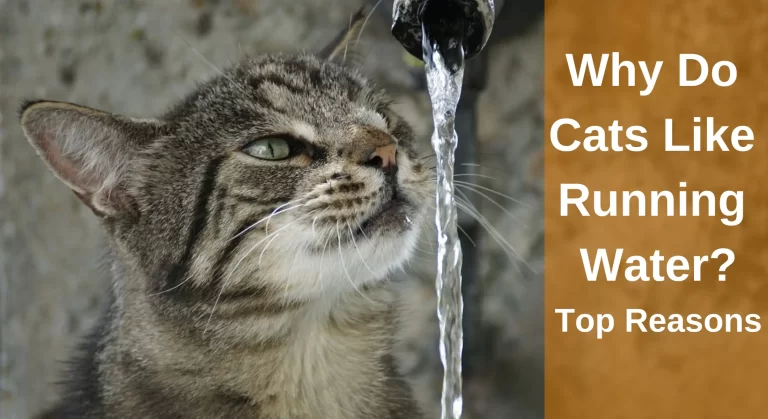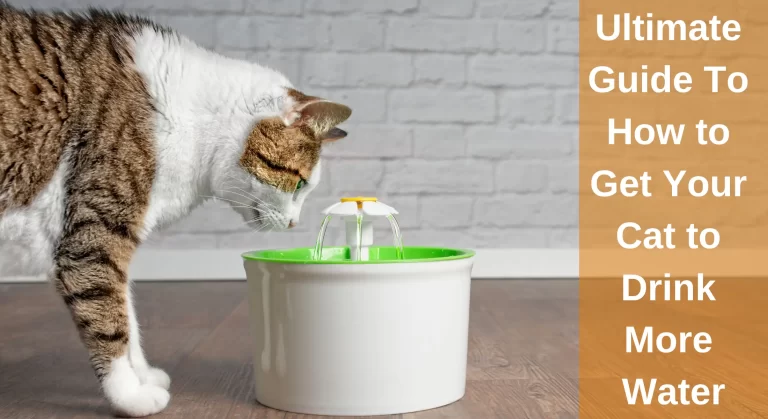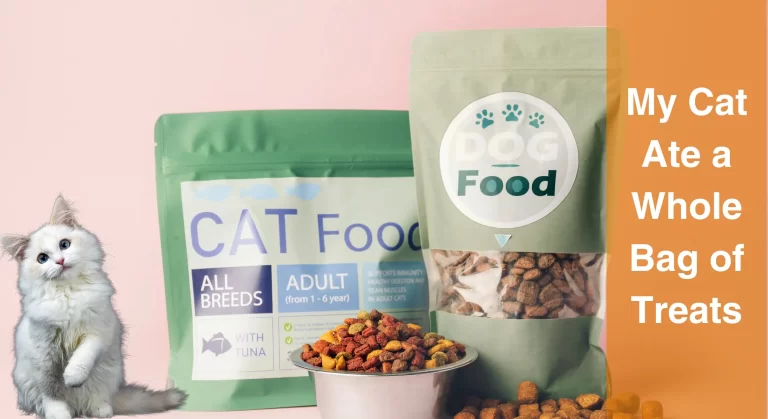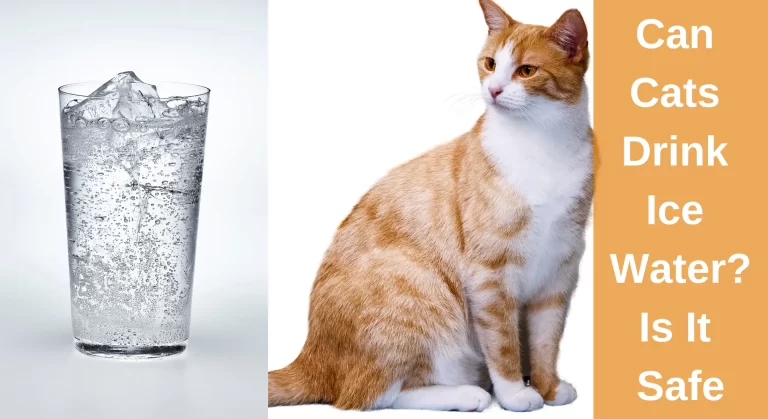Is Coconut Oil Safe For Cats? Benefits And How To Use
Coconut oil has become very popular recently. From cooking to beauty to health, this multi-purpose oil has many benefits. No wonder cat parents wonder if its benefits can also be extended to their pets. Is Coconut Oil Safe For Cats? Can Cats Eat Coconut Oil?
Yes, cats can eat coconut oil and it is safe for cats. Coconut oil has numerous potential health benefits for your cat, which can be used both externally on his coat and internally for various health benefits.
The fat and calorie content of coconut oil is very high, with just one tablespoon containing 14 grams of fat, 12-13 grams of saturated fat, and 117 calories. In order to minimize the effects of coconut oil’s fatty nature, it is recommended to consume it gradually and in small amounts.
It is important to be aware of the following if you consistently use coconut oil for your cat: Excessive use may lead to diarrhoea, nausea, vomiting, or other digestive issues. This article dives into the details of the use of coconut oil for your furry friends.

What Is Coconut Oil?
Coconut oil is a solid white fat; derived from coconuts (pretty self-explanatory from its name) and is used in food and beauty products. It contains medium-chain triglycerides (MCTs), which are much easier to digest and convert to energy than long-chain fatty acids.
Some MCTs that coconut oil contains are caprylic, capric, and lauric acid. Caprylic and capric acid are both used for their anti-fungal properties, while lauric acid has additional anti-bacterial and anti-viral characteristics.
Can Cats Eat Coconut Oil?
Yes. Coconut oil is not toxic for cats, which means it can be given to your feline with caution. It’s always a good idea to consult your vet before giving your pet coconut oil, as any changes in diet should be discussed.
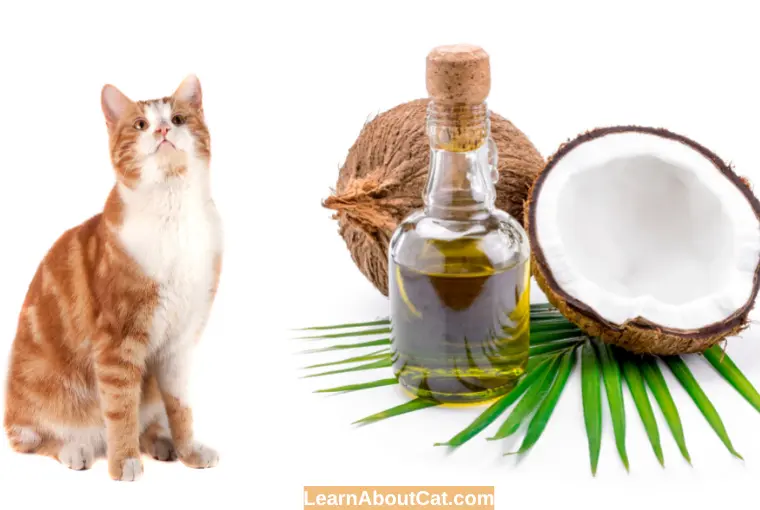
If your pet ingests an excess of coconut oil, it will cause gastrointestinal upset and your cat will pass loose, greasy stools. Additionally, it is high in calories, so you must balance your cat’s diet to prevent having an obese cat.
There are many claims of the widespread benefits of coconut oil for cats by cat parents like it clears skin irritation, kills fleas, and cures inflammation and constipation, to name a few. However, it should be noted that none of these claims is supported by scientific evidence.
Coconut oil needs to be researched in a controlled environment with a sizable testing population that is replicable and peer-reviewed to ascertain its safety and efficacy.
Therefore, despite countless claims, there’s really no way to be entirely sure if coconut oil is effective or not. However, since its non-toxic, it can be used as a natural remedy for feline ailments.
Why Do Cats Like Coconut Oil?
A good source of essential fatty acids, coconut oil is great for skin, hair, and teeth. Because it is hydrolyzed, coconut oil is good for health. There has been a recent trend among “expensive” cat food labels to include coconut oil in their canned foods.
It is suspected that the cat craves and enjoys the fat in food as another taste, and finds it highly rewarding because it is so energy dense. Many cats, including humans, can detect the ‘fattiness’ of food as an almost different flavour.
What Type Of Coconut Oil Can You Use For Your Cat?
It is recommended to use commercially produced coconut oil specifically made for cats. Either that or completely virgin coconut oil should be used. Make sure that there are no additional ingredients as they might be harmful to your feline’s health.
The Raw Paws Organic coconut oil has the highest rating on Amazon and Chewy, while if your cat has digestive issues, there is an organic virgin version of this that might suit your pet better. We recommend Alpha Pet Zone Coconut oil for skin issues.
Benefits of Coconut Oil for Cats– Is Coconut Oil Good for Cats?
Coconut oil has many advantages, and many of these benefits can be reaped for your furry friend. If you intend to add coconut oil to your cat’s diet, be sure to consult with your veterinarian first.
Here are some main advantages coconut oil can bring to your cat:
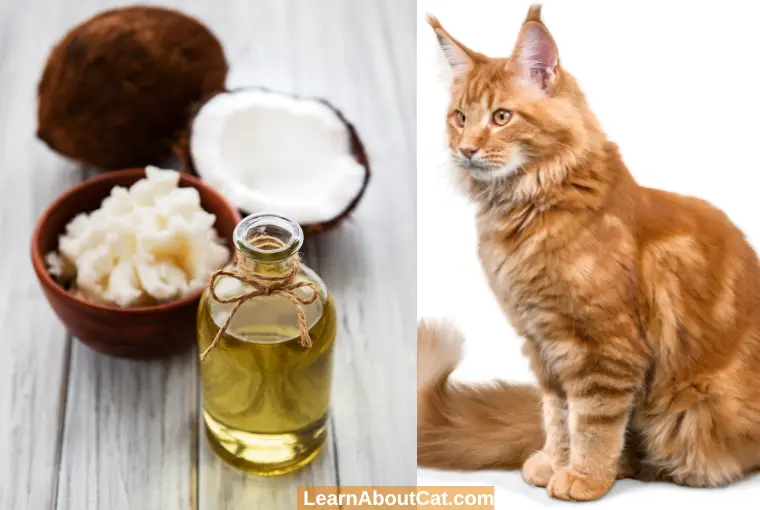
1. It Boosts Fur and Skin Health
Almost all cats go through some kind of skin issues during their lifetime, from fleas to skin irritation to dry skin and psoriasis. Coconut oil is an excellent natural moisturizer with anti-microbial properties that can clear up a lot of these ailments.
Additionally, coconut oil in your cat’s hair suffocates fleas, getting rid of those pesky parasites and relieving your feline’s itching. Your cat doesn’t need to have fur problems for you to use coconut oil topically on it.
Applying it regularly can give your cat thick and soft, healthy fur, just like it gives us softly, rejuvenated hair when we use it for ourselves.
2. Treats Constipation – Helps in Digestion
If your cat is having bathroom troubles, licking coconut oil can help it easily digestible and improve nutrient absorption from food. Since it contains MCAs (medium fatty acids) and has natural laxative properties, it can effectively relieve constipation in your feline friend.
Additionally, it contains lauric acid, which has antimicrobial qualities and treats your cat’s digestive problems. With its high lauric acid content, coconut oil is also known for its ability to eliminate harmful bacteria from your cat’s gut, which supports a healthy gut microbiome.
Coconut oil has antibacterial, antiviral, and antifungal properties that are beneficial for digestive health, assist in healing digestive tract injuries and prevent chronic inflammation.
3. Strengthens Immune System
Because of the anti-microbial elements of coconut oil, the positive impact that it has on your cat’s immune system keeps your pet safe from viral and bacterial infections. It also combats allergic symptoms and other common ailments in your canine companion.
Coconut oil contains lauric acid, which is converted into monolaurin, which is effective at killing disease-causing bacteria without harming beneficial bacteria.
A pet’s immune system is protected by monolaurin, which helps it maintain a healthy state and speed up its recovery from illness when it occurs.
Additionally, it contains antifungal, antibacterial, antiviral, and anti-yeast properties, which assist in quickly clearing up allergic reactions.
4. Great for Senior Cats
As cats grow older, they start exhibiting signs of mental decline, just as humans do. Coconut oil contains MCTs (medium chain triglycerides) that boost brain development and protect your feline from the adverse effects of ageing such as dull coat, dry skin, loss of mobility, and lack of interest and enthusiasm.
The benefits of coconut oil for pets include improved health and energy levels, as well as the ability to restore much of the young love for life in your pet. Since coconut oil contains ketones, these are extremely powerful sources of energy that can be utilized by all cells and organs in the body to function better.
As the heart, brain, and other muscles and organs get more fuel, the body functions more smoothly. In senior cats, this can have a dramatic rejuvenating effect
5. Heals Inflammation
Just like humans, as cats grow older, they develop arthritis, which is an inflammatory disease. Coconut oil contains anti-inflammatory compounds (lauric acid) which can compact the inflammatory substances released in your pet’s system, making your cat more mobile and boosting its energy levels, alleviating painful symptoms your pet might be experiencing.
6. Prevents Hairballs
Now, this is something that annoys many cat owners, cat hair everywhere. Since coconut oil strengthens your cat’s coat, there is less shedding of its fur, making hairballs and shedding a thing of the past.
The irritation caused by hairball regurgitation in your cat’s respiratory tract can be reduced with coconut oil. Furthermore, it eases hairball passing by improving digestion and adding moisture to the stool.
Coconut oil can make your cat’s life much easier by adding just a pinch to his food every day.
7. Supports the Liver
Your cat’s liver has two enemies: viruses and free radicals. After ingesting coconut oil, it is absorbed by the intestines of your feline and goes directly to your liver, where it fights against both of these.
Also, since it contains MCTs, it does not need to be digested by the liver, so it is great to give to a cat suffering from liver disease.
It has been found that coconut oil protects against liver toxicity in recent studies on coconut oil and liver health
8. Coconut Oil for Cat Gingivitis Treatment
A common cause of gingivitis is bad breath, inflammation, pain, tooth loss, and infection. This isn’t just a human problem, cats can also get gingivitis. For eliminating the bacteria that cause gingivitis, reducing pain, and inflammation, and fixing kitty halitosis, you can rub coconut oil on your cat’s gums or give them coconut oil cat treats, either bought or homemade.
9. Slow Kidney Disease and Cancer
A study conducted by PetMD states omega-3 fatty acids found in coconut oil can assist in the slowing of kidney dysfunction progression, and PetEducation states these acids may even slow cancer progression. Besides providing energy and protein to cats, coconut oil contains amino acids that provide energy as well.
You may be able to slow the progression of kidney disease and cancer by giving your cat half to one teaspoon a day or mixing this amount into their food.
Check Out: Can Cats Eat Canola Oil?
How to Give Cats Coconut Oil/ How Can I Use Coconut Oil?
Taking coconut oil for your cat may not be as easy as it seems. First, you must consult your veterinarian before using it on your cat. He or she can tell you what is safe, and how much to use.
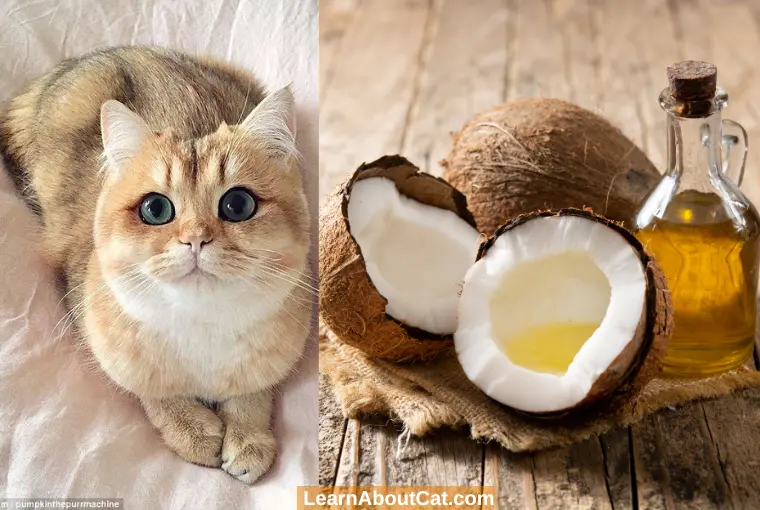
Topical Use
When used topically, it may seem safe and relatively simple to administer, rub it onto your hands and massage it into your cat’s fur. Nevertheless, your cat will probably lick off the oil after it is applied, inhaling the oil and potentially irritating the skin.
When you apply the oil topically to your cat, you must use an Elizabethan collar to keep it from licking off the oil.
Use an over-the-counter shampoo that includes organic coconut oil (despite the fact that most cats are reluctant to get a full bath), but make sure the shampoo is for cats after all.
Oral Use
Cats are picky when it comes to what they eat, so you will need to mix it with their food. Simply mix melted coconut oil in their canned, wet, or kibble. Be sure to follow your vet’s instructions when it comes to quantity and frequency.
If you are just starting out with it, introduce it gradually, because some cats tolerate it better than others, or maybe they are allergic to it, a rare occurrence but it can happen with any diet supplement. There is also a risk of diarrhoea if too much is added too quickly.
How Much Coconut Oil Can I Give My Cat?
You can give your cat a quarter to half (1/2 to 1/4) a teaspoon once or twice a day. However, some vets recommend giving 1/8th of a teaspoon.
If you are treating or preventing hairballs with coconut oil, you can give it far less frequently than usual, for instance, a few times a week. In general, you should begin small and adjust the amount as needed.
What happens if My Cat Licks Coconut Oil? Risks of Coconut Oil for Cats
If your cat takes a lick or two of coconut oil, nothing terrible will happen as it is essentially non-toxic for cats. However, keep the jar of coconut oil away from your pet, as too much intake will cause gastrointestinal upset and greasy diarrhoea.
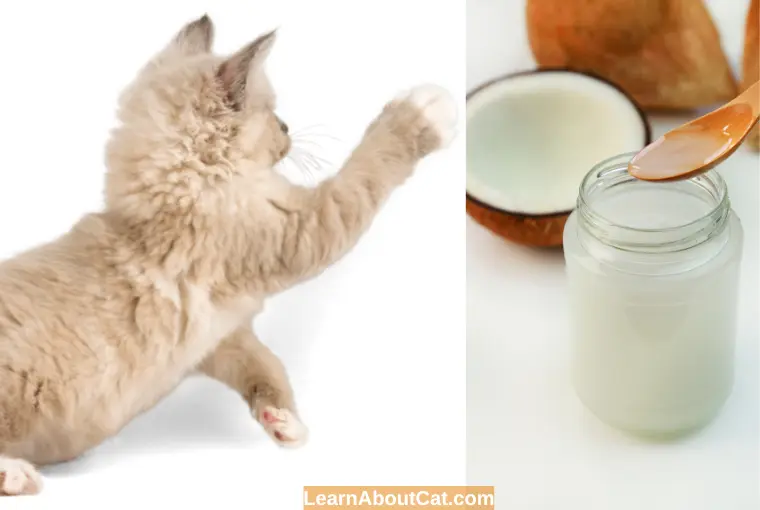
It’s important to note that while coconut oil has some benefits for cats, it’s on the ASPCA’s list of “People Foods to Avoid Feeding Your Pets,” which advises that it may not cause much harm but could upset the stomach or cause diarrhoea.
In cats with pancreatic inflammation, it is advised against using it, as it contains high-calorie content and saturated fats, and some cats may be sensitive to it.
The calories in coconut oil will also increase your cat’s weight, so if you start feeding your cat coconut oil you should cut back elsewhere in the diet as well.
Interesting Read: Can Cats Eat Cranberries?
Alternatives to Coconut Oil for Cats
If your cat is being particularly picky about ingesting coconut oil, or you are worried about its high calories, there are other things you can use.
Fish oil is a great alternative. It contains omega-3 fatty acids, and cats enjoy the taste. For use on the skin and fur, you can swap it with olive oil, which is also nourishing to the skin and coat and is non-toxic for your furry friend.
Frequently Asked Questions
What oil is best for cats?
Fish oil, coconut oil, hemp oil, cod liver oil, olive oil, and sunflower oil are great for cats.
Is coconut oil safe for cats’ paws? / Can I put coconut oil on my cat’s dry skin?
Yes, coconut oil is safe for topical use on your cat as it is non-toxic.
When applied on your cat’s paws before going outside, coconut oil can act as a protective topcoat which will protect its paws from the environment. Your feline’s skin can also be protected against skin cancer and sunburn by applying a thin layer.
Can coconuts make cats sick?
Yes, coconuts can cause your pet gastrointestinal upset as it is rich in sugars, fats, and potassium.
Can Coconut Oil Cause Pancreatitis in Cats?
Regular consumption of coconut oil may increase the pet’s overall fat content, which is not ideal for some pets. Furthermore, coconut oil may worsen pancreatitis and hyperlipidemia (high levels of lipids in the blood), which is why its oral use is very controversial.
What does coconut oil do for cats?
Coconut oil has antibacterial properties that soothe skin, heal acne in cats, and prevent infection. Fats in coconut oil suffocate parasites such as fleas, mange, and ticks, allowing them to die
Wrap Up!
Coconut oil is non-toxic to cats and has many potential benefits. While there is scarce scientific evidence backing up the use of coconut oil in cats, cat owners swear by its benefits. When used in moderation, of course, your feline can also benefit from this superfood.
Related Posts:
Who is Isabella?
My name is Isabella, and I am a dedicated and knowledgeable cat enthusiast. With years of experience caring for cats and a deep love for felines, I made a mission to help other cat lovers navigate the challenges of cat ownership.

